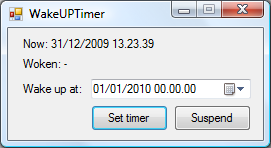
Introduction
Sometimes, it might be useful to automatically turn on the PC at some time in the future. To do this, we'll use a little trick: usually, a computer is not capable of powering itself up, but it's able to recover from standby or hibernation (if the hardware is capable of it).
Background
The code is mainly a wrapper around two system timer functions: CreateWaitableTimer and SetWaitableTimer. That's because the timer is able to resume the system, if told to. The declaration is:
[DllImport("kernel32.dll")]
public static extern SafeWaitHandle CreateWaitableTimer(IntPtr lpTimerAttributes,
bool bManualReset,
string lpTimerName);
[DllImport("kernel32.dll", SetLastError = true)]
[return: MarshalAs(UnmanagedType.Bool)]
public static extern bool SetWaitableTimer(SafeWaitHandle hTimer,
[In] ref long pDueTime,
int lPeriod,
IntPtr pfnCompletionRoutine,
IntPtr lpArgToCompletionRoutine,
bool fResume);
We need to provide a date and a time, but SetWaitableTimer asks for a long integer value... DateTime.ToFileTime() is the function that we'll use to convert date/times from managed to system representations.
Take a look at the core of the program, where we call the two API functions:
long waketime = (long)e.Argument;
using (SafeWaitHandle handle =
CreateWaitableTimer(IntPtr.Zero, true,
this.GetType().Assembly.GetName().Name.ToString() + "Timer"))
{
if (SetWaitableTimer(handle, ref waketime, 0,
IntPtr.Zero, IntPtr.Zero, true))
{
using (EventWaitHandle wh = new EventWaitHandle(false,
EventResetMode.AutoReset))
{
wh.SafeWaitHandle = handle;
wh.WaitOne();
}
}
else
{
throw new Win32Exception(Marshal.GetLastWin32Error());
}
}
You can notice an "e.Argument" in the first line. It's there because the following block of code pauses the execution of the thread until the timer reaches the "wake time" value:
using (EventWaitHandle wh = new EventWaitHandle(false,
EventResetMode.AutoReset))
{
wh.SafeWaitHandle = handle;
wh.WaitOne();
}
So, to avoid blocking the UI thread, we need to put that block of code into a separate thread, controlled by a BackgroundWorker object to which we'll pass the wake time as an argument. This is where "e.Argument" comes from.
I needed to create a class for easy re-use, so I decided to provide an event: "Woken". The event gets triggered as soon as the background thread exits:
public event EventHandler Woken;
void bgWorker_RunWorkerCompleted(object sender,
RunWorkerCompletedEventArgs e)
{
if (Woken != null)
{
Woken(this, new EventArgs());
}
}
So, to recap, this is the full class:
using System;
using System.Text;
using System.Runtime.InteropServices;
using Microsoft.Win32.SafeHandles;
using System.ComponentModel;
using System.Threading;
namespace WakeUPTimer
{
class WakeUP
{
[DllImport("kernel32.dll")]
public static extern SafeWaitHandle CreateWaitableTimer(IntPtr lpTimerAttributes,
bool bManualReset,
string lpTimerName);
[DllImport("kernel32.dll", SetLastError = true)]
[return: MarshalAs(UnmanagedType.Bool)]
public static extern bool SetWaitableTimer(SafeWaitHandle hTimer,
[In] ref long pDueTime,
int lPeriod,
IntPtr pfnCompletionRoutine,
IntPtr lpArgToCompletionRoutine,
bool fResume);
public event EventHandler Woken;
private BackgroundWorker bgWorker = new BackgroundWorker();
public WakeUP()
{
bgWorker.DoWork += new DoWorkEventHandler(bgWorker_DoWork);
bgWorker.RunWorkerCompleted +=
new RunWorkerCompletedEventHandler(bgWorker_RunWorkerCompleted);
}
public void SetWakeUpTime(DateTime time)
{
bgWorker.RunWorkerAsync(time.ToFileTime());
}
void bgWorker_RunWorkerCompleted(object sender,
RunWorkerCompletedEventArgs e)
{
if (Woken != null)
{
Woken(this, new EventArgs());
}
}
private void bgWorker_DoWork(object sender, DoWorkEventArgs e)
{
long waketime = (long)e.Argument;
using (SafeWaitHandle handle =
CreateWaitableTimer(IntPtr.Zero, true,
this.GetType().Assembly.GetName().Name.ToString() + "Timer"))
{
if (SetWaitableTimer(handle, ref waketime, 0,
IntPtr.Zero, IntPtr.Zero, true))
{
using (EventWaitHandle wh = new EventWaitHandle(false,
EventResetMode.AutoReset))
{
wh.SafeWaitHandle = handle;
wh.WaitOne();
}
}
else
{
throw new Win32Exception(Marshal.GetLastWin32Error());
}
}
}
}
}
Using the Code
If we have a Button and a DateTimePicker on a form, we can write something like this:
private void button1_Click(object sender, EventArgs e)
{
WakeUP wup = new WakeUP();
wup.Woken += WakeUP_Woken;
wup.SetWakeUpTime(dateTimePicker1.Value);
}
private void WakeUP_Woken(object sender, EventArgs e)
{
}
And to suspend the system:
Application.SetSuspendState(PowerState.Suspend, false, false);
Important note: the last parameter, disableWakeEvent, needs to be false.
Troubleshooting
If the software doesn't work, it doesn't necessarily mean that your hardware doesn't support it. It's possible that some Windows setting is preventing the awakening of the system. To make sure that the settings are correct, check that:
- In "Control Panel > Power Options > Change Plan Settings > Change Advanced Power Settings > Sleep > Allow Wake Timers", all items are enabled.
- If there is no password set on your Windows account, make sure that in "Control Panel > Power Options > Change Plan Settings > Change Advanced Power Settings > Brad / Additional Settings > Require a password on wakeup", all items are disabled (thanks nanfang).
Points of Interest
I used a BackgroundWorker for a simple reason: the code in the Woken event must be in the same thread of the user interface for easy access to controls. With standard thread management, that's not so trivial.
History
- v1.0 - 2009/12/31 - Initial release.
- v1.1 - 2010/10/03 - Fixed a bug and updated article (troubleshooting section).
This member has not yet provided a Biography. Assume it's interesting and varied, and probably something to do with programming.
 General
General  News
News  Suggestion
Suggestion  Question
Question  Bug
Bug  Answer
Answer  Joke
Joke  Praise
Praise  Rant
Rant  Admin
Admin 









 )
)